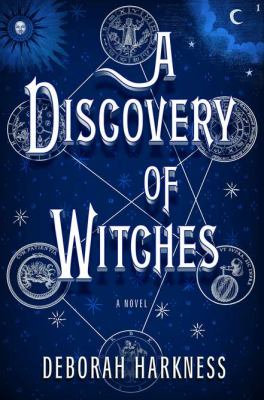A discovery of witches by Deborah E. Harkness (All souls trilogy)
About the book
Author: Harkness, Deborah E., 1965-
Title: A discovery of witches; Series: All souls trilogy
- A discovery of witches (DA41609, ISBN9780670022410), 2011, read by Imogen Church (579 pages ; 25 hours, 31 minutes)
- Shadow of the night (DA45810, ISBN9780670023486), 2012, read by Karina Fernandez (584 pages ; 25 hours, 22 minutes)
- The book of life (DA49922, ISBN9780670025596 ), 2014, read by Jennifer Ikeda (561 pages; 23 hours, 55 minutes)
Publication: New York : Viking, 2011, 2012 & 2014.
About the story
This is a trilogy that involves vampires and time travel. No, wait! Keep reading! Not those kinds of vampires… well, yes, those kind, but you hardly notice, really.
I know, it sounds very cheesy but Deborah E. Harkness is an historian: the research into the time periods was done right and she writes very well. It’s very readable, and there is a tolerable amount of sex (in most vampire tales, the sex comprises most of the story and grammar is often eschewed). There is sex in a NSFW context, but not enough to leave you blushing uncontrollably as it’s read out loud to you.
So, starting over: This is a trilogy that involves vampires and time travel. And witches. And a magic house. Hmm.
Starting over: In A discovery of witches fictional historian Diana Bishop is researching her topic on the history of science in the Bodleian library at Oxford, when she comes across an unusual manuscript, one that has been lost for hundreds of years. Magically hidden in the special collections, Diana’s reading of the book sets in motion a maze of occult happenings. Coming as she does from a long line of New England witches, Diana is aware of the book’s power and sends it back straightaway. But, it’s too late. Weird stuff happens.
The second book, Shadow of night, is mostly set in the England of the 1590s. Diana’s love Matthew reclaims his identity as a poet and spy and member of the School of the Night, a secret society of learning that runs counter to the religious zeitgeist of the times. All very cloak and dagger.
The third and final book, The book of life, returns to present day and to the mysterious Ashmole 782 manuscript — specifically, to the missing pages thereof. The alchemical flavours underlying the previous two books are thrust to the fore and the imagery and its significance play a huge role in the story.
The books are each read by different narrators, which slows down the re-integration of the story if, like me, you read the books over a broad-ish period of time. Despite that, this is an excellent series that is good fun and mentally engaging to read. Or, I’m a sucker for period fiction (which is also true). I like the characters, I like the plots – which never seem overly long – and I like the way the story unfolds over several time periods.
Recommended?
Good for people who enjoy supernatural or historical fiction.
